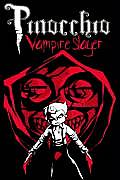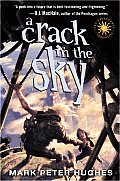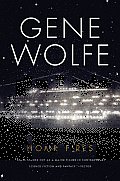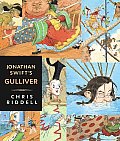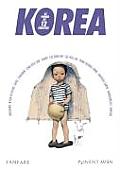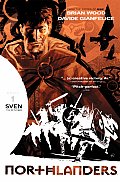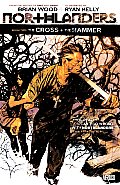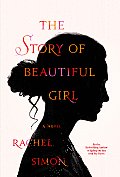Link to this review in the form of a comic strip by geneambaum tagged paranormal • horror • graphic novel • classic
Link to this review by sarahhunt tagged biography • science
Merlin Tuttle kept a journal of his wildlife observations since he was a little kid. When he was a teenager, he spotted gray bats living in a nearby cave. The books he consulted said that they didn’t migrate, but he was pretty sure he saw them do just that. When he wrote to the Smithsonian Institution they took him seriously and sent him some bat bands so he could start his own research. He went on to found a conservation group and educated people on the important role bats play in local ecology. His group is now creating new habitat and doing research into a new fungal infection threatening bats, white-nose syndrome.
Why I picked it up: Gene said I should read it. He knows I like science books, and this is another book in the great Scientists in the Field series.
Why I finished it: When Tuttle started writing his own books about bats to dispel the negative image of the animals, he noticed that in pictures, bats were often held by their wings, teeth bared. The bats looked angry and stressed! He decided to take pictures of the bats when they are happy and relaxed, “bats just being bats.” The pictures that Uhlman took for the book follow Tuttle’s example: bats eating, hibernating, and hanging out with mom. They’re so adorable! I learned that bats communicate with each other by chattering in frequencies humans can hear — mothers can find their children in a crowded cave by communicating back and forth — and that bats are genetically more like primates than like mice! The work that the volunteers are doing creating and maintaining new places for bats to raise their young (they only have one baby a year!) and to safely hibernate is impressive, requiring a lot of research to make sure the bats get what they need.
I’d give it to: Dru, who lives in cave country, for the information about hibernating bats: their heartbeats drop to 10 per minute (instead of the usual 1000) and they end up covered in dew droplets! The caves have to stay cold so the bats don’t wake up during the winter, because if they do they’ll run out of energy before spring.
Link to this review by flemtastic tagged coming of age • science fiction
Eli Papadopoulos is practically royalty. His grandfather founded InfiniCorp. It provides everything from entertainment to food, from government to the domed cities that keep everyone safe. (Motto: “Don’t Worry, InfiniCorp is taking care of everything!”). Soon, Eli will take a job befitting his social status. But agitators from the Friends of Gustavo try to recruit him, and he becomes the focus of unwanted attention from InfiniCorp’s security spheres. When Eli discovers the truth about InfiniCorp and his paranoid, power-hungry cousin, it might be too late for him and the world.
Why I picked it up: Recommended to me by a family that lives nearby and often shares books with me. (Thanks, Roetcissoenders!)
Why I finished it: This was a mixture of environmental disaster, action, and dystopia. That’s a lot to pack into a book for grade-school/middle-school students, but Hughes does a credible job of keeping things hopping and kids turning pages. It was hard to wait for details about what was going on outside the domes and the savages that live there. I am waiting for the sequel.
I’d give it to: My friend Nick, whose family raises ferrets, because Eli has a genetically engineered mongoose that can communicate with him (and that’s close enough). Chloe, whose her family is so eco-conscious they’d prefer to live in a yurt, using only solar power, and eating home-grown organic beets with every meal.
Link to this review by flemtastic tagged romance • science fiction • coming of age
Lena is almost eighteen. In ninety-five days she will have surgery to cure Amor Deliria Nervosa. After the operation, she will no longer be in danger of loving anyone, and will be free of all its negative effects. Then Alex, the boy she sees at her surgery board examination, continues to pop up. Lena is soon wondering whether her feelings are the beginnings of the disease of love. A trip to the Wilds, the area outside the protected city, turns her desire for the treatment into horror. But she will not have a choice about having her feelings removed unless she and Alex make it over the electrified fence, where the Invalids who have caught the disease live.
Why I picked it up: I enjoyed Oliver’s last book Before I Fall for its realistic teen dialogue and its difficult-to-pull-off, Groundhog Day-like plot.
Why I finished it: My middle school library patrons cannot get enough dystopia about ordered societies that are rotten behind the scenes. Once they catch wind of the devil-may-care romance between Alex and Lena, they will want to see how it turns out, like I did.
I’d give it to: Amber, a former raver, who would enjoy the description of illegal parties in bombed out city blocks, in defiance of the roaming enforcers squads. Chris, who would recognize the sterile society of 1984, Brave New World, and the more recent Matched, because he’d enjoy reading this with his twelve-year-old daughter.
Link to this review by billba tagged science fiction
A standard sci-fi setup: humanity is fighting a war with aliens in distant stars, and the soldiers they send there come back many years later, but still young thanks to relativistic effects. This is the story of a married couple, Skip and Chelle. He stayed on Earth, she joined the military. When she returns they are both surprised to find they are still in love despite their considerable age difference.
Why I picked it up: Most of the action also takes place on a cruise ship, and I’m still feeling nostalgic about our family’s Disney Cruise a couple of years ago. It, too, had pirates and aliens.
Why I finished it: As a welcome-home gift Skip brings Chelle’s mother back to life (it’s the future, remember?). She is a lot closer to Skip’s age than her daughter is, and their mature sexual tension is both uncomfortable and sweet.
I’d give it to: Penny Arcade’s Jerry Holkins, who gushed to me years ago about Wolfe’s The Fifth Head of Cerberus. I tried it and appreciated the writing, but found it a tad too literary for my tastes. This one is much more accessible.
Link to this review by theo tagged picture book • classic • fantasy
A man travels all around the world to very strange places: Lilliput, filled with tiny people with strange rules and laws; Brobdingnag, where the people are Chinese giants; and Laputa, a floating island where “Flappers” bonk deep thinkers on the head to keep them from falling off the edges.
Why I picked it up: It was a Christmas present from my Nana. The cover looked funny.
Why I finished it: The checklist (with illustrations) by the Lilliputians of what Gulliver had in his pockets. For his gun they wrote, “Right hand trouser pocket: A hollow pillar of iron about the length of a man, attached to a huge piece of wood with more strangely shaped pieces of iron sticking out of the side.”
I’d give it to: My daddy, who would like the funny pictures and the arguments between the Lilliputians and the Blefuscudians like the one about where you should break your eggs.
Link to this review by geneambaum tagged nonfiction • graphic novel • anthology
12 comic creators, 6 Korean, 6 French, give their impressions of Korea in short black and white stories, fictional and autobiographical.
Why I picked it up: I met Sophie Goldstein, co-writer and artist of Darwin Carmichael is Going To Hell at NEWW. After hearing she’d recently lived in Korea for a year, I had a case of verbal diarrhea about Korea. I used to live there, too, but I haven’t been back for ten years. I picked up this book to see what had changed.
Why I finished it: The good news (for me) is Seoul, including the Namdaemun Market and Seoul Station, doesn’t seem much different than when I was last there. The better news is that these comics include gritty, real-life accounts of Korea, the likes of which I’ve only seen in Doha’s The Great Catsby. The first story, Choi Kyu-Sok’s outstanding and occasionally anthropomorphic “The Fake Dove” shows the homeless and how they’re treated and ignored. The street scenes in Vanyda’s “Oh Pilsung Korea!” were so real she had me singing Ace of Base’s “The Sign” (which was inescapable, blasting from every street vendor’s cart, when I was there). But it was Igort’s “Letters from Korea” that really reminded me of the amazing things I saw and the people I met. It gives the sense I always had, that a great day in Korea is a bit inexplicable and can’t ever be replicated.
I’d give it to: Rodney, who would like Hervé Tanquerelle’s “A Rat in the Country of ‘Yong’” because it would remind him of Speigelman’s Maus. And to Fred, who would smell the old lady’s nasty belch on the subway in Vanyda’s story and also appreciate Matiew Sapin’s drawing of beondegi (yum).
Link to this review by geneambaum tagged historical fiction • graphic novel
Sven the Returned — As a child, Sven defied his culture and refused to believe in Valhalla. He fled Orkney and ended up a member of the elite Varangian Guard in Constantinople. Decades later, Sven’s father is killed in a raid. His uncle Gorm takes over Grimness Settlement, claiming his brother’s lands and men. Sven returns home for the wealth that is his birthright. He finds that he has few friends and learns that some things are worth dying for. (Contains Northlanders 1-8.)
The Cross and the Hammer — AD 1014, Ireland. The Magnus was once a warrior with wealth and land. But after Ireland was conquered, he became a one-man insurgency. He’s been killing the Norse king’s men for months. Nothing else matters but keeping his daughter safe. And she’s never going to be safe with foreigners occupying their land. (Contains Northlanders 11-16.)
Blood in the Snow — a collection of four shorter stories (contains Northlanders 9, 10, 17-20):
-Northern England, AD 793. Edwin’s father punishes him for not being good enough with his sword to defend the holy island where they live. Edwin hates his father and his older brother. He sees himself as Norse and proud like his mother was. When vikings come ashore to raid the monastery, he believes they’re there to save him.
-A tale of single combat.
-AD 868, Danish Mercia. Three women escape a saxon raid. They hide their treasure, hole up in an old Roman fortress, and prepare to face the fifty Saxons who are after them.
-AD 1009. Sven of Orkney is now an old man. A group of young men come to kill him and make their reputations.
Publisher’s Rating: Suggested for Mature Readers.
Why I picked it up: Brian Wood is an amazing writer. And the first brutal half-hour of Valhalla Rising left me with a craving for Viking violence.
Why I finished it: Gory, character-driven violence.
I’d give it to: The other dads in the theater who groaned at the bloodless, Disney-fied vikings in How to Train Your Dragon.
Link to this review by dawnrutherford tagged romance • historical fiction
It’s 1968. Lynnie and Homan have fallen in love. She is white, developmentally disabled, pregnant, and hasn’t spoken a word in over a decade. He is black, deaf, and can only communicate in a colloquial sign language he learned as a child. They are both inmates at The School for the Incurable and Feebleminded. Both are determined that Lynnie’s baby will not become a prisoner there, too, so they escape. After Lynnie gives birth, they find brief refuge with a retired schoolteacher named Martha. Then Lynnie is captured, Homan runs away, and Martha sets off on a journey to protect the baby no matter what it takes.
Why I picked it up: Last year I read Asylum: Inside the Closed World of State Mental Hospitals.
Why I finished it: It explores the demise of state asylums, hippie communes, and lighthouses. Plus the story is moved along by Martha’s network of pen-pals (I’m a snail-mail aficionado).
I’d give it to: My dad, who has three things in common with Martha: they’re both dedicated to helping people, awesome letter-writers, and (unbeknownst to themselves) big romantics.
